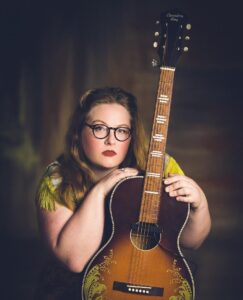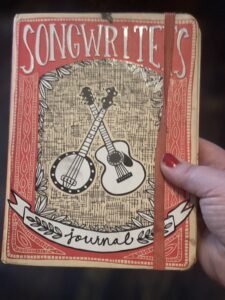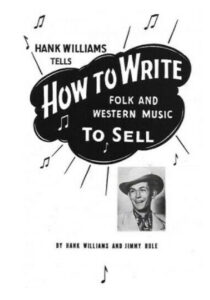Trigger Warning: This post contains content about domestic violence. If you or a loved one is experiencing violence at home, please contact the National Domestic Violence Hotline 1(800) 799-SAFE (7233)
There is something about writing a song that can scratch your brain in the most wonderful way, it makes you feel hyper-present; and removed from the trauma of existing. It’s like you get to take all the hurt and fold it back, and organize it into three neat little verses and a chorus. You can play it over and over; and hey you might even make some money doing it!

That feeling is what drew me to songwriting. I’ve been thinking a lot about Kris Kristoferson since his passing, and how he liked to quote the English poet William Blake’s thoughts on creativity. Blake said that if you were called to be creative by the divine you were “obligated to do so,” and that if you didn’t pursue your talent, sorrow and desperation would follow you throughout life, and even after death it would “shame and confuse you until eternity.” I don’t know about eternal shame, but I do know my need to create has fundamentally driven me. It has allowed me to be actively engaged with my life, and present with the most traumatic of experiences. I can always sit down and find joy from writing a good line.
Choosing the creative life path also saved me. After my first heartbreak I lost everything, my job and apartment. The man I had fallen deeply in love with had knocked me so hard in the mouth that he punched my front teeth loose, and from that my whole life became loose. I didn’t know what to believe in anymore, I moved back home and couldn’t find steady work; family issues lead me to living in a van and squatting in an apartment with a drug addicted dobro player. And then out of nowhere, I played at an open mic one night, and the gigs started rolling in. Gigs that paid decent, $175 for two hours plus tips, it was more money than I had ever seen, and I thought ok, I can do this.

A songwriter at open mic once told me “Life isn’t a competition, it’s an exhibition, and everyone has something special to share.” Those words have helped me through the hardest parts of creating music; the judgment, fame game, the body shaming, and comparisons to other “big time” artists. Musicians like my friend Matty Sheets, who also just recently passed away, encouraged me to keep writing. Matty had me on air at his show on the community radio station WUAG in Greensboro, NC long before I had ever recorded anything. His excitement and willingness to share good music for the sake of the music helped light a fire within me for promoting local artists. It has led me to cherish the writers that might not be on the billboards, but work tirelessly to foster creative scenes in rural areas throughout the Southeast. If you want to hear some excellent songwriting, go listen to Matty’s music here.
While I can’t tell you how to write a song because there’s so many ways to do it, I can suggest a few books and tips for new songwriters:

Uncommon Goods makes a great Songwriter’s Journal and it’s organized in verse chorus verse bridge sections with separate pages to write in music and fret diagrams. I think any journal works for songwriting, but that one is really useful.
Also Hank Williams Sr. and Nashville songwriter Jimmy Rule’s How to Write Folk and Western Music to Sell is full of common sense advice for songwriting. One tidbit that has helped me, is that the “concept” of your song should be reflected in the title, and the title should come from the main line of your chorus. Hank says the title should be no more than five words long. I haven’t always stuck to this rule, but I think making songs concise, and direct is very powerful. Also the realization that songs are about concepts, whether it’s a back street affair, or a cold, cold heart; it’s the concept of the song that creates a backbone for the rest of the verses to follow, just like a thesis statement in an essay.
Tom T. Hall’s The Songwriter’s Handbook is another one I would recommend. Tom T. is known as “The Storyteller” of country music, and he saw “songwriting is as much a craft as it is a talent “. He was known for waking up at the crack of dawn with his coffee, and writing as a daily practice. Tom T. says that every line should be able to stand by itself, and be a complete thought. Take for example the line from his hit song Harper Valley PTA:
“I wanna to tell you all a story ‘bout a Harper Valley Widowed wife”

It says a lot, and gives context to what we’re talking about; a story that wants to be told, about a widowed wife from Harper Valley. Whereas a new writer might write a more cliche line like:
“Well let me tell you a story”
It’s much weaker, and does nothing to define the direction or concept of the song. At any rate, thinking about the strength and power of each line has been a huge writing tool.
I’m thankful to share my two cents on songwriting, and hope this post helps light a new fire for someone. If you feel the urge to create, I’m with Blake, you have to do it! Be encouraged, it will make your life much richer, not just from the potential gigs (which by the way now-a-days pay less and are harder to come by) but from the perspective you will gain about life’s twists, turns, traumas, and tribulations.
This blog goes along with our current Special Exhibit: Songwriter Musicians, on display now through December 31, 2024.
Ella Patrick is an associate producer and DJ for Radio Bristol, she is also a songwriter who sings under the moniker Momma Molasses, and performs regionally.


